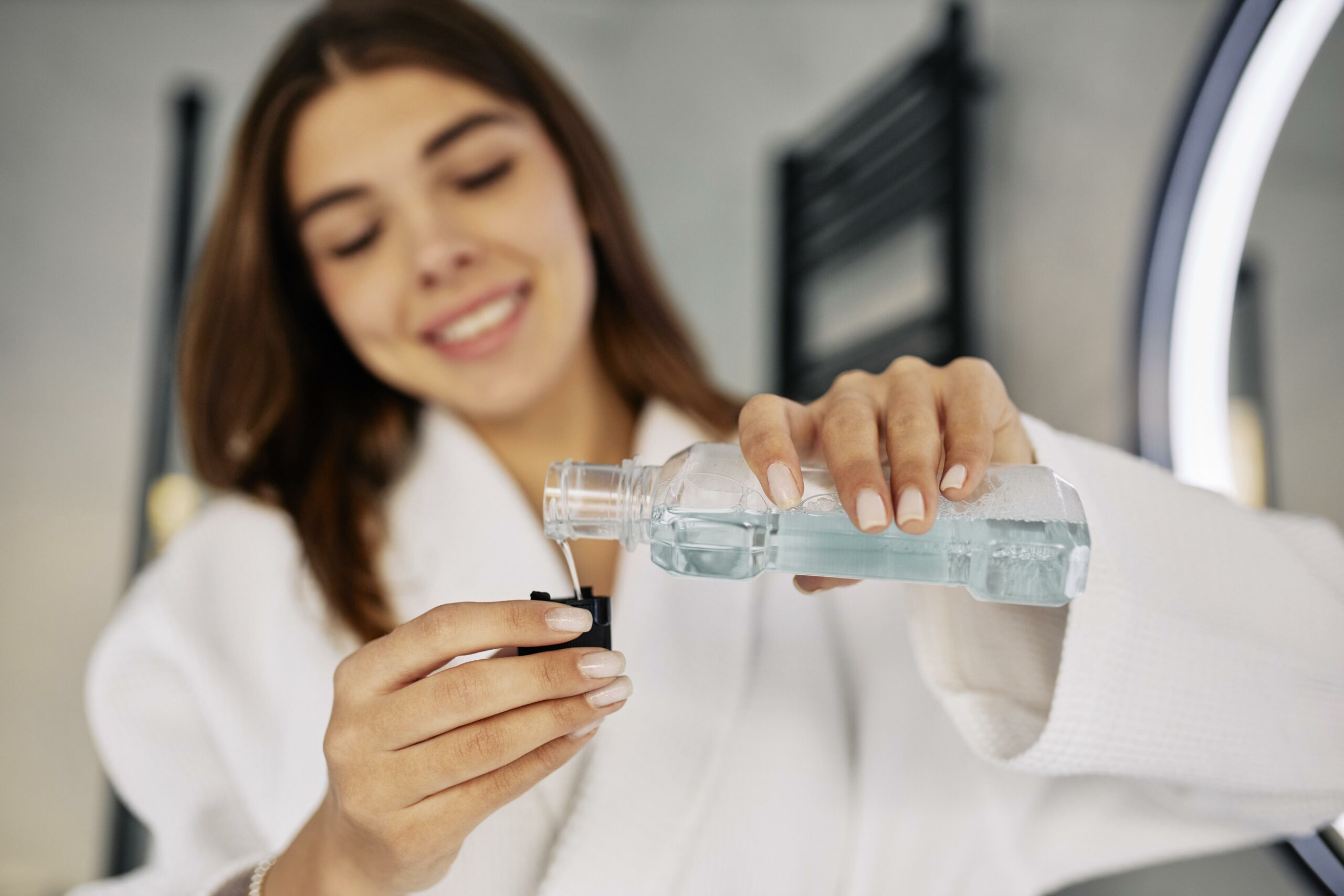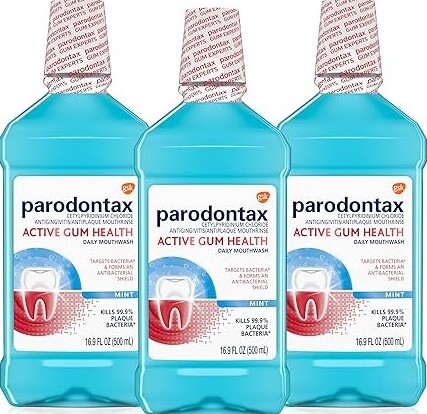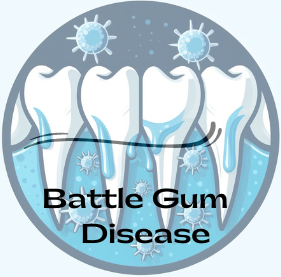
Almost half of all adults over 30 in the United States suffer from periodontal disease, commonly referred to as gum disease. Gum inflammation (gingivitis) is an early symptom, and it can develop into more serious infections that harm the bone and tissue that support your teeth. It can affect your general health and cause tooth loss if you don’t get treatment.
Many dentists advise using a therapeutic mouthwash as part of a thorough oral hygiene regimen, even if brushing and flossing are still crucial. But which mouthwash is best for periodontal disease, given the abundance of options available? This guide breaks everything down for you with helpful advice and suggestions supported by experts.
What Is Periodontal Disease, and Why Is It Serious?
When plaque—a sticky layer of bacteria—is not sufficiently cleared from the gums, periodontal disease, a persistent inflammation of the gums, results. There are stages to the condition’s advancement:
- Gingivitis: Gums become red and swollen and may bleed easily.
- Periodontitis: Gums pull away from teeth, forming pockets that become infected. Without treatment, bone and connective tissue are destroyed.
Why Does It Matter?
- Leads to tooth loss in severe cases.
- Linked to systemic issues like heart disease, stroke, and diabetes.
- Lower self-confidence can be due to bad breath and poor oral appearance.
Role of Mouthwash in Periodontal Treatment
Although mouthwash isn’t a magic wand, it helps maintain healthy gums by
- Killing bacteria that brushing and flossing miss
- Reducing inflammation and soothing gum tissue
- Helping prevent plaque buildup
- Reaching deep into gum pockets
It’s particularly beneficial for people who are prone to gum problems or having expert treatments like scaling and root planing.
What to Look for in a Mouthwash for Periodontal Disease
When selecting a mouthwash, look for solutions that are therapeutic rather than merely festive. Here are important components and qualities to search for.
Recommended Ingredients:
| Ingredient | Function |
|---|---|
| Chlorhexidine Gluconate | Antibacterial, prescription strength |
| Cetylpyridinium Chloride (CPC) | Fights plaque and gingivitis |
| Essential Oils (e.g. thymol, menthol) | Antimicrobial and soothing |
| Fluoride | Strengthens enamel, cavity prevention |
| Hydrogen Peroxide | Mild antiseptic, aids healing |
What to avoid in a mouthwash:
- Alcohol-based rinses if you have sensitive gums
- Products with added dyes or sugars
Top Recommended Mouthwashes for Periodontal Disease
The following mouthwashes are recommended by experts and effectively treat gum disease:
| Parodontax Active Gum Health Mouthwash | Designed specifically for gum health, alcohol-free, mild taste | Active Ingredient Cetylpyridinium Chloride | Best for daily gum maintenance and early-stage gum issues |
| Listerine Total Care Gum Protection | Contains essential oils, ADA-approved, reduces plaque | Contains alcohol; may sting | Best for those who want a powerful, over-the-counter option |
| Crest Pro-Health Clinical Mouthwash | Alcohol-free, anti-gingivitis, targets plaque and bacteria | Active Ingredient is CPC | Best for sensitive users who want a strong daily defense |
| TheraBreath Healthy Gums Oral Rinse | Alcohol-free, non-burning, uses aloe and CPC | No Information | Best for natural product fans and people with chronic bad breath |
| Chlorhexidine Gluconate Rinse (e.g., Peridex) (Prescription Only) | Gold standard for treating periodontitis | May cause tooth staining, not for long-term use | Best for severe gum disease under dental supervision |
Prescription vs. Over-the-Counter: What’s the Difference?
| Feature | OTC Mouthwash | Prescription Mouthwash |
|---|
| Strength | Mild to moderate | High (e.g., Chlorhexidine 0.12%) |
| Usage | Daily long-term | Short-term treatment |
| Cost | Affordable | Higher (insurance may cover) |
| Side Effects | Minimal | Possible staining, taste alteration |
Oral contraceptives are excellent for mild instances and preventative measures. Prescription rinses are used briefly and are only for moderate to severe gum disease.
How to Use Mouthwash Effectively for Gum Health
Proper technique ensures you get the full benefit.
Steps to Follow Below:
- Brush and floss first.
- Measure the correct dose (usually 10–20 mL).
- Swish for 30–60 seconds.
- Avoid rinsing with water or eating/drinking for 30 minutes afterward.
Recommended Usage:
- Once or twice daily, depending on the mouthwash and your dentist’s advice.
- Prescription rinses are often used for 2 weeks to 1 month only.
Other Tips to Improve Periodontal Health
Don’t limit yourself to mouthwash! A comprehensive strategy is most effective.
Oral Hygiene Essentials:
- Brush twice daily with a soft-bristle brush
- Floss or use interdental brushes
- Consider an electric toothbrush for better plaque removal
Lifestyle Changes:
- Eat a balanced diet rich in vitamins C and D
- Avoid smoking (major gum disease risk)
- Schedule professional dental cleanings 2–4 times per year
Choosing the Right Mouthwash for You

If you use the appropriate mouthwash for your needs, it can significantly improve your battle against periodontal disease. The most important factors are consistency and proper cleanliness practices, regardless of whether you use an over-the-counter product like Parodontax or a rinse that your dentist prescribes, such as chlorhexidine.
Conclusion
Including the proper mouthwash in your daily dental hygiene regimen will significantly improve your continuing battle against periodontal disease. Although brushing and flossing are still important practices, mouthwash adds an additional layer of defense by focusing on bacteria, lowering inflammation, and getting to places your toothbrush might miss. Depending on the severity of your disease and your level of comfort, it’s important to select a therapeutic rinse that contains tried-and-true substances like essential oils, cetylpyridinium chloride, or chlorhexidine.
There is a product available to meet your unique needs, whether you’re using Parodontax to treat early-stage gum disease or need a prescription-grade solution like chlorhexidine gluconate. Your gums will have the best chance of healing and long-term health if you use the proper mouthwash in conjunction with regular dental treatment and lifestyle modifications like giving up smoking and eating a diet high in nutrients. Never be afraid to ask your dentist for advice specific to your oral health condition. A healthy existence is largely dependent on having healthy gums, which are well worth the effort.
If in doubt, consult your dentist for specific advice. Your gums will appreciate it!
FAQs
Can mouthwash reverse periodontal disease?
No, but it can help prevent progression and support healing after dental treatment.
Is alcohol-based mouthwash bad for my gums?
Alcohol can irritate sensitive gums. If that’s a concern, choose alcohol-free options like TheraBreath or Crest Pro-Health.
How long should I use a prescription rinse?
Usually 7–14 days. Long-term use may cause side effects like staining.
“Here’s a little transparency: Our website contains affiliate links. This means if you click and make a purchase, we may receive a small commission. Don’t worry, there’s no extra cost to you. It’s a simple way you can support our mission to bring you quality content.”
